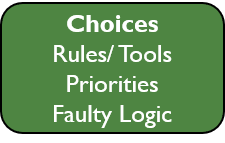
Insight cannot be taken back.
You cannot return to the moment you were in beforeHilary Mantel
Do I have a choice?
Alternatives exclude; we have to give up one thing to have another, but the challenge of choices is that we often ‘sit at a crossroads taking neither path because we cannot take both’ (Weelis). A decision can be a point of childish guilt where we feel we ‘should’ rather than a defined choice.
Antonio Damasio found that patients with damage to the ventral-medical prefrontal cortex plays a critical role in decision making. It works out contingencies and relationships in information, prioritising and arranging things that demand our immediate attention. People with damage to this area are completely rational but lack judgement. (Malcolm Gladwell, “Blink“)
Our brains are affected more by loss than gain, we will strive not to-lose something even if we never had it. This can be:
| Loss of Face | Loss of Esteem | Loss of Status |
| Loss of Credibility | Loss of Respect | Loss of Property |
| Loss of Relationships | Loss of Choices | Loss of Meaning |
William James identifies 5 types of decision:
- Reasonable – a decision that is reasoned with arguments for and against, with the assumption that we are free to choose
- Wilful decision. This is one done with inward effort and very rare
- Drifting decision. Where there’s no paramount reason for either course of action so we drift according to external circumstance. How many lives are like that?
- Impulsive decision. Where we act automatically although the decision might seem accidental
- Decision based on a change of perspective. This is the consequence of an outer experience or change of heart. It can be an insight into a situation, or a leap of faith.
In fact, all decisions are a variation of fight, flight or freeze.
We have two systems of reasoning (Steven Sloman), (Kahneman & Frederick 2002)
- Experiential-automatic, fast, ‘intuitive’, parallel-processing. This is highly emotional and gives quick acts of prowess. It provides short cuts, often biased and is Fast & Frugal (Goldstein)
- Thinking, reasoned, slow, logical, progressive and self-aware.
| System 1 |  |
System 2 |
| Intuition & instinct 95% of the time |
Rational Thinking 5% of the time |
|
| Unconscious Fast Associative Automatic Pilot |
Takes Effort Slow Logical Lazy Indecisive |
Most of our mistakes in reasoning comes from using System 1, when we think we are using System 2. How? Since we react without thinking and introspection, the main property of system 1 is our lack of awareness of it. (Taleb, 2008)
Freewill and Determinism
We tend to believe what we do is right
God Complex
Philosophers have asked for millennia whether we really do have a choice. Did God roll the dice, and set our lives in motion, or in a secular age, is it just down to our genes and environment? Determinism assumes having no choice. In reality, we do have at least two choices – do nothing, or do something. “I will to do something.” We have three types of willpower: (Otto Rank, 1920a)
- Counter will – opposition to another’s will
- Positive will – willing what one must do
- Creative will – willing what one wants
We might have motive or willpower to change, but it’s only until we choose to change can we actually change.
Hence choices are important. Will power is like a muscle. The more we use it, the less willpower we have. So, the more we move towards aligning the creative will with our direction, we will have more will power to resist what we don’t want to do. This takes us back to the issue of identity – when you believe you are a new person that’s let go of the hold of the past, it is easier to make the new choices, rather than the old person who is resisting what is bad.
Resources